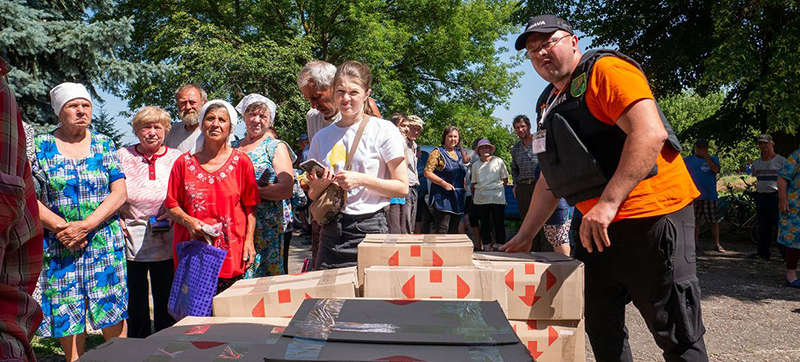 Ukraine
Ukraine New York: UN agencies and entities have underlined their continued support to Ukraine, as Wednesday marked six months since the start of the war devastating the country.
Matilda Bogner, head of the UN Human Rights Monitoring Mission in Ukraine, called for greater efforts to spare and protect civilians.
The Mission has been in the country since 2014, when it began work documenting violations stemming from the fighting in the east between Government forces and mostly pro-Russian separatists.
Ms. Bogner said the resulting escalation of the eight-year long armed conflict has brought more death, suffering, damage, and destruction.
Humans, not numbers
“Every day, we speak with people affected by the war, and hear about and document violations of international human rights and humanitarian law, including war crimes,” she said.
Since the start of the Russian invasion on 24 February, there have been 13,560 civilian casualties, with 5,614 deaths, including 362 children, and 7,946 people injured.
Most casualties, 92 per cent, were caused by the use of explosive weapons with wide area effects in populated areas.
“We know that the actual figures are considerably higher. Each of these figures is a human being, whose life or health has been lost or damaged,” said Ms. Bogner.
The Mission has also documented 327 cases of arbitrary detention and forced disappearance in territory controlled by Russian forces and affiliated armed groups. While 105 victims were released, 14 persons – 13 men and one woman - were found dead.
Additionally, 39 arbitrary arrests were recorded in Ukrainian Government-controlled territory, and 28 other cases that may amount to enforced disappearance.
“Many of these victims, on both sides, have faced torture,” said Ms. Bogner, who underscored that “human beings, whoever they are, must be treated with dignity”.
She added that prisoners of war also must be protected, as guaranteed under international law.
While the Mission has access to prisoners of war and other conflict-related detainees in Government-controlled areas, this is not the case for those held in other locations.
“We call on the Russian Federation to grant independent monitors full access to all individuals detained in relation to the armed conflict by the Russian Federation, including those held by Russian-affiliated armed groups,” she said.
Food at home and abroad
Throughout the war, the World Food Programme (WFP) has been using every opportunity to assist people, both within Ukraine and beyond.
WFP has disbursed more than $200 million to internally displaced Ukrainians, while some 11,000 families in neighbouring Moldova are receiving cash transfers to cover additional expenses for hosting Ukrainian refugees.
Overall, nearly seven million people have found shelter in European countries, according to the UN refugee agency, UNHCR.
WFP reported that within days of the start of the conflict, staff began serving ready-to-eat meals and distributing bread to people in Ukraine.
Kits containing items such as meat or beans, sunflower oil, pasta and rice, are also being provided to families wherever food is unavailable or difficult to access.
Grain exports critical
Prior to the war, Ukraine was a major global breadbasket and produced enough food to feed 400 million people a year.
WFP has been working with the Government and partners to both push for and facilitate grain exports through key Black Sea ports, as well as alternative land river routes.
Last week, the first shipment of Ukrainian grain for the agency’s operations left the port of Pivdennyi in Odesa and is now on the way to the Horn of Africa, where the spectre of famine haunts more than 20 million people.
Amid the ongoing global food crisis, WFP explained that allowing the export of Ukrainian grain is critical to stabilize global markets and alleviate hunger, but it also has direct benefits for Ukrainians.
The agricultural sector is an essential component of the economy, and also a direct source of livelihood for many of the 13 million citizens living in rural areas.
Delivering health care
Addressing the Security Council on Wednesday, UN Secretary-General António Guterres stressed that with the onset of winter, humanitarian needs in Ukraine continue to rise rapidly, and millions will require assistance and protection.
The World Health Organization (WHO) and partners are preparing for a challenging winter ahead and have been taking stock of lessons learned so far.
"Six months of war have had a devastating impact on the health and lives of Ukraine's people, but despite many challenges the health system has managed to survive and deliver care where and when it is needed most," said Tedros Adhanom Ghebreyesus, the WHO Director-General.
More supplies expected
The UN has helped deliver more than 1,300 metric tonnes of critical medical supplies to Ukraine, in coordination with the Ministry of Health and partners.
More are on the way, including power generators, ambulances and oxygen supplies for medical facilities, as well as supplies for trauma and emergency surgeries, and medicines to help treat noncommunicable diseases.
Although Ukraine’s health system has been shaken, Tedros said it has not collapsed.
“WHO continues to support the Ministry of Health of Ukraine to restore disrupted services, displaced health workers and destroyed infrastructure, which is essential not only for the health of Ukraine's people, but for the country's resilience and recovery,” he added.
“But no system can deliver optimum health to its people under the stress of war, which is why we continue to call on the Russian Federation to end this war”.
Support Our Journalism
We cannot do without you.. your contribution supports unbiased journalism
IBNS is not driven by any ism- not wokeism, not racism, not skewed secularism, not hyper right-wing or left liberal ideals, nor by any hardline religious beliefs or hyper nationalism. We want to serve you good old objective news, as they are. We do not judge or preach. We let people decide for themselves. We only try to present factual and well-sourced news.







